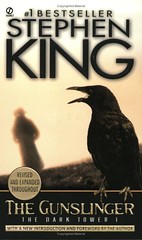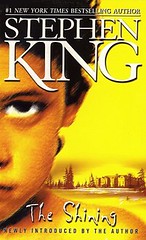
The Gunslinger / Stephen King
New York : Signet, 2003
xxviii, 300 p.
Originally published: 1982
The Dark Tower, v. 1
This heroic fantasy is set in a world of ominous landscape and macabre menace that is a dark mirror of our own. A spellbinding tale of good versus evil, it features one of Stephen King's most powerful creations -- the gunslinger, a haunting figure who embodies the qualitites of the lone hero through the ages, from ancient myth to frontier Western legend.
This has been a pretty Stephen King-heavy blog, and I'm afraid that's not going to end anytime soon, which is strange considering how average I've found some of the things I've read. Icon status goes a long way for me.
The Gunslinger fits in the high-average category, but when I say that you have to imagine a HUGE asterisk next to it leading to a footnote that reads "I realize it is rather unfair to judge this book at all since it is only volume one of what is essentially one long novel." I could wait and evaluate The Dark Tower as a whole, but honestly, if you're going to publish an epic story over numerous decades, each potion needs to stand up to criticism. That's how I rationalize it.
So as a book, The Gunslinger is high-average, but as the first part of a giant series it is full of promise. Being basically an introduction, it is high on mystery and low on explanation and revelation. This is to be expected, but I wouldn't hate a more concrete idea on what exactly is going on.
The setting is ambiguous, which starts the reader on an unbalanced footing. It was a good move. King throws you into the world with a character who knows a lot, tells you very little, and expects you to catch up. It's interesting at first, but the constant stumbling gets frustrating, and I found myself wanting one or two key concepts spelled out so I could summarize the book beyond "there's this guy chasing this other guy and this kid comes." What is appealing about this is the feeling of drifting in a world where there is so much possibility. Almost anything can happen because we have no idea what can't.
I'm willing to bet it also invites rereads of the series once a person has the whole of it under his belt. In fact, if I were to reread this book right now after just finishing it, it might work very well.
The backstory of the main character is presented in extended flashback sequences, which were some of the best parts of the book, partially because the parameters of the world were more firmly-established. It's not always clear when King skips about in time, which added to my general bewilderment, but eventually you'll pick up on the rhythm of it.
At the beginning King exhibits an unpleasant and gratuitous obsession with sexuality. Most of it was needless references to balls and stuff, and it felt like the book was written by a 14-year-old. It goes away early on, though, so just bear with it.
But basically The Gunslinger does in a whole book what most fantasy books do in the first 4 chapters. It gets you started, throws a lot of ideas at you, and says "We'll work this out eventually; just put it all in your head." And it does this well. To justify it as a standalone novel, King has a basic plot arc including a dramatic turn, but it was too early in the overall story to carry much weight. If you're willing to take the time to read a multi-book epic (i.e. you've ever touched anything by Robert Jordan), then... well... good for you. I'm not recommending anything yet.




